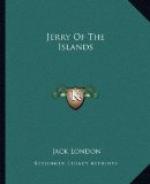Nor was he any more ridiculous because of the soup-plate than was he ludicrous because of his nakedness. He was royal. His father had been a king before him, and he had proved himself greater than his father. Life and death he bore in his hands and head. Often he had exercised it, chirping to his subjects in the tongue of Langa-Langa: “Slay here,” and “Slay there”; “Thou shalt die,” and “Thou shalt live.” Because his father, a year abdicated, had chosen foolishly to interfere with his son’s government, he had called two boys and had them twist a cord of coconut around his father’s neck so that thereafter he never breathed again. Because his favourite wife, mother of his eldest born, had dared out of silliness of affection to violate one of his kingly tamboos, he had had her killed and had himself selfishly and religiously eaten the last of her even to the marrow of her cracked joints, sharing no morsel with his boonest of comrades.
Royal he was, by nature, by training, by deed. He carried himself with consciousness of royalty. He looked royal—as a magnificent stallion may look royal, as a lion on a painted tawny desert may look royal. He was as splendid a brute—an adumbration of the splendid human conquerors and rulers, higher on the ladder of evolution, who have appeared in other times and places. His pose of body, of chest, of shoulders, of head, was royal. Royal was the heavy-lidded, lazy, insolent way he looked out of his eyes.
Royal in courage was he, this moment on the Arangi, despite the fact that he knew he walked on dynamite. As he had long since bitterly learned, any white man was as much dynamite as was the mysterious death-dealing missile he sometimes employed. When a stripling, he had made one of the canoe force that attacked the sandalwood-cutter that had been even smaller than the Arangi. He had never forgotten that mystery. Two of the three white men he had seen slain and their heads removed on deck. The third, still fighting, had but the minute before fled below. Then the cutter, along with all her wealth of hoop-iron, tobacco, knives and calico, had gone up into the air and fallen back into the sea in scattered and fragmented nothingness. It had been dynamite—the MYSTERY. And he, who had been hurled uninjured through the air by a miracle of fortune, had divined that white men in themselves were truly dynamite, compounded of the same mystery as the substance with which they shot the swift-darting schools of mullet, or blow up, in extremity, themselves and the ships on which they voyaged the sea from far places. And yet on this unstable and death-terrific substance of which he was well aware Van Horn was composed, he trod heavily with his personality, daring, to the verge of detonation, to impact it with his insolence.
“My word,” he began, “what name you make ’m boy belong me stop along you too much?” Which was a true and correct charge that the boys which Van Horn had just returned had been away three years and a half instead of three years.




